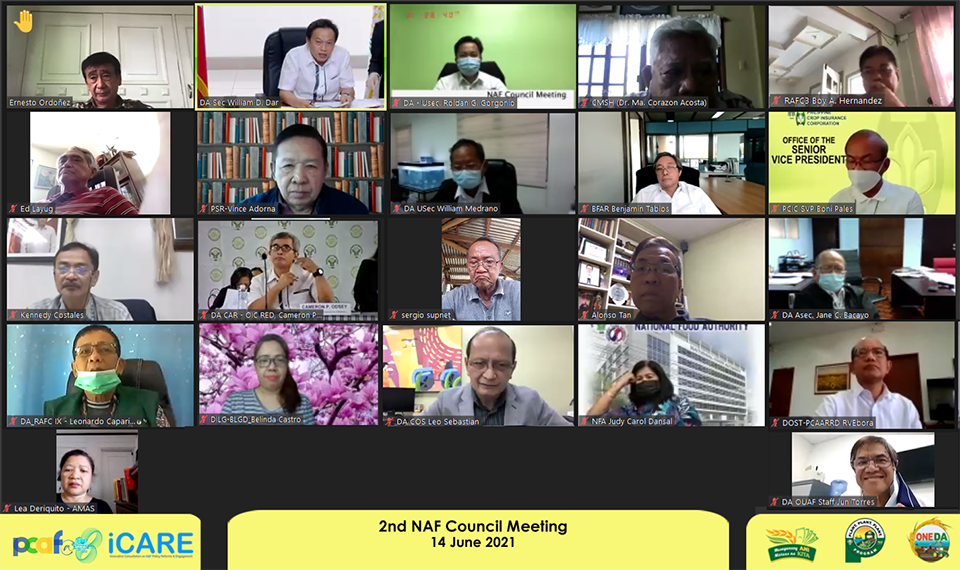
The National Agriculture and Fisheries Council (NAF Council) conducted its second meeting for the year on June 14 to discuss the budget utilization of the Department of Agriculture (DA) as well as the plan and budget proposal of the Department for Fiscal Year (FY) 2022.
During the meeting, the Council moved for the endorsement of DA’s FY 2022 Plan and Budget Proposal that was presented. However, it was emphasized during the meeting that DA’s initiatives programmed under Tier 2 should be given an equal importance as Tier 1 since these initiatives are equally important in achieving agricultural and fisheries reforms in the country.
The DA’s FY 2022 total recommended budget is PhP231.76 Billion (B) with its Tier 1 Proposal at PhP77.4B and Tier 2 Proposal at PhP154.3B. The recommended budget for the major agricultural sectors are as follows: PhP33.49 B for rice, PhP7.21B for corn, PhP11.34B for high-value crops, PhP22.36B for poultry and livestock, and PhP 28.18B for fisheries.
The DA’s FY 2020 performance was also presented and was likewise accepted by the private sector council members particularly on how it responded to major challenges faced by the agriculture sector, mainly the COVID-19 pandemic, African Swine Fever (ASF) outbreak, with programs such as the Bayanihan I and II and the Hog Indemnification Project, with figures on the amounts of funds utilized and the number of beneficiaries.
“We move for the endorsement of the motion to move for the DA FY 2022 PBP, (noting that the) programs and projects under Tier 2 will be included for full appropriation as they should be given equal importance in the budget appropriations,” said Dr. Ernesto Ordonez of Alyansa Agrikultura.
DA also encouraged the participation of the private sector to increase their investments in the agri-fishery sector while the government initiates sound policies and provides financial assistance to the farmers and fisherfolks. It was mentioned during the meeting that only 4% of the agricultural output is contributed by the government while the remaining 96% is from the government sector which shows the importance of the role of the private sector in the local agriculture industry.
The overall increase in the budget of DA was also appealed by the Council to deliver the interventions needed by the agri-fishery sector. At least PhP2B should be allocated for hog credit programs while the Philippine Crop Insurance Corporation (PCIC) should get at least PhP5B to provide the necessary insurance programs of the agri-fishery industries especially at the onset of climate change.
Private sector representatives also called the Department of Budget and Management (DBM) to change their internal policy limiting the Department’s authority to coordinate with private sector stakeholders. According to them, they should be allowed to appeal directly to DBM together with DA during budget deliberations.
It was also raised that policies on tariff and non-tariff barriers (NTBs) are in place and import only what is needed for domestic demand to protect the local industry from possible injuries from imported commodities.
In conclusion, the NAF Council passed two resolutions. First is the endorsement of DA’s FY 2022 Plan and Budget Proposal (PBP) to the Department of Budget and Management (DBM) and strongly endorses both Tier 1 and 2 as both contain critical components to achieve the sector’s targets.
The proposed resolution also highlighted DA’s Food Security Framework following the strategies: Survive- which focuses on resiliency programs and budgets; Reboot- which accelerates the implementation of strategic thrusts; and Grow- which seeks to increase the investments and resources to ensure food sufficiency and DA-LGU co-financing of agri-development programs.
Second is the recommendation to DBM to allow the participation of the private sector in the technical budget hearings on DA’s budget which emphasizes the significance of the private sector’s role and stake in the government budget crafting process embodied in the National Budget Memorandum No. 109 issued by the DBM in 2010 which states that “citizen participation shall be a vital component of the entire budget process anchored on transparency and accountability;”
The NAF Council serves as the highest mechanism for agriculture and fisheries consultations and dialogues between and among national government agencies, local government units, civil society organizations, and private sector stakeholders. | CCB











